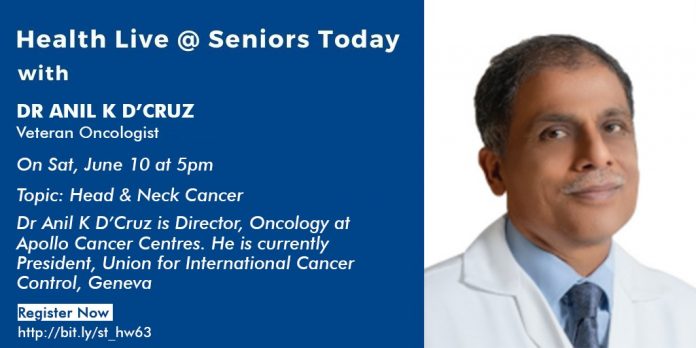On 10 June, 2023, Seniors Today hosted their weekly Health Live webinar with Dr Anil K D’Cruz who spoke on and answered questions about Head and Neck Cancer.
About Dr Anil K D’Cruz – Dr Anil K D’Cruz, MS, DNB, FRCS (Hon), is Director, Oncology Apollo Cancer Centres. He is well-recognised as a global leader, clinician, researcher and teacher in Head and Neck Oncology. He was Director of Tata Memorial Hospital and Chief of Head Neck Services with over 33 years experience in the field of cancer. Dr D’Cruz is currently President, Union for International Cancer Control (UICC). Headquartered in Geneva, the UICC is the largest cancer organisation globally committed to the cause of cancer control comprising 1121 member organisations across 171 countries. Established in 1933, he is the first Indian to hold this position. In recognition of his professional standing in the field, he was awarded the Honorary FRCS from the Royal College of Surgeons London.
Dr D’Cruz has held leadership positions and is on the board of numerous professional organisations, universities, research organisations and cancer institutions across the country and abroad. He is an avid researcher and his landmark contribution in management of neck nodes in oral cancers awarded the plenary at the American Society of Clinical Oncology (ASCO) 2015 and subsequently published in the New England journal of Medicine, the first from the Tata Memorial Hospital in this prestigious journal. He worked on research in the use of curcumin and was part of a project to develop and validate molecular cytogenetic studies/Proteomics in oral cancers, results of which were filed for a patent.
Dr D’Cruz has more than 250 peer-reviewed publications and chapters to his name and is a member of the Editorial Board of many reputed national and international journals.
He has delivered more than 500 invited lectures and nearly a 100 named lectures, keynotes and orations both nationally and internationally. He has also been a special invitee to over 100 conferences nationally and internationally to demonstrate head and neck, thyroid surgery. Dr D’Cruz’s special areas of interest are oral/laryngeal cancers, thyroid, parathyroid, salivary glands and neck diseases. He is also specially trained for head and neck surgery at Sloan Kettering Cancer Centre, New York, Laser Surgery at Vanderbilt University, USA and speech rehabilitation at Indianapolis, Indiana, USA. Thyroid cancer is an area of special interest.
Cancer is a disease that is increasing. We had 12 million cases in 2012, 18 million in 2018 and 19.3 million in 2020 globally.
1 in 5 men and 1 in 6 women will develop cancer in their lifetime, globally.
1 in 8 men and 1 in 11 women will die of cancer, globally.
The incidence of cancer is predicted to rise to double the numbers by 2040, in our country. And it is going to be one of the major causes of mortality and morbidity in our country.
Worldwide, lung cancer is the most common cancer contributing 11% of all cancers and 18% of all deaths.
In our country, 25% of all our cancers are head and neck cancers. Contrast this to the west where its incidence is only 4-5%.
This is so, because tobacco is a socially accepted custom in our country.
It is not only tobacco, alcohol in excess, sharp teeth, ill fitting dentures, poor dental hygiene are also responsible for head and neck cancer. Predominantly this will happen in the oral cavity.
In the west, an infection of the Human Papilloma Virus (HPV) is also known to cause cancer in the younger population, non- smokers, it is predominantly a sexually transmitted disease.
Head and neck cancers include cancers involving everything from and between your brain up to your collar bones/ clavicle.
Of all these cancers, oral cavity includes 40% of all these head and neck cancers. These are also occasionally called cancers of the upper aero- digestive tract.
Apart from oral cavity cancers, we also have cancers of the pharynx, larynx, hypopharynx, oropharynx, nasopharynx. In head and neck cancers we also have tumours of thyroid gland, salivary glands, tumours of the neck.
The implications of head and neck cancers are function and cosmetics with poor outcomes. This is because the patients usually present at a later stage of the disease.
Only 10% of the patients present in stage 1 and 2. The delay is often caused by the patients themselves. This is because they either go to non medical personnel for treatment, alternative/ traditional modes of treatments or are just in denial.
The average delay seen is 7-8 months and in this time the disease has progressed to stage 4.
Stage 1 has a 90% cure rate, function morbidity and cosmetic implications are mild. Cost of treatment is also less.
In stage 4, we can help less than 40% of our patients, functional and morbidity treatment implications are severe. Cost of treatment is severe.
This is why we should visit the doctors at the earliest.
Risk factors for head and neck cancers:
- The mucosa of the oral cavity is pink in colour, the colour of this lining turns white or red in colour- which in case you’re a tobacco user is called a pure malignant lesion.
- White patch is called leukoplakia
- Red patch is called erythroplakia
- Blockage of 1 side of the nose or bleeding from one side of the nose
- Hoarseness of voice
- Pain while eating
- Foreign body sensation at the back of your throat
- Dysphasia- difficulty in swallowing
- Lumps in your neck
- Referred pain in your neck
If you have any of these symptoms and they persist for 4 or more weeks, you need to go and see a specialist.
The only modality of treatment in these cancers is surgery and radiotherapy. Chemotherapy and immunotherapy cannot treat the disease by themselves.
For locally advanced disease, we need to use multiple modalities for treatment and the whole treatment is prolonged for more than four months.








